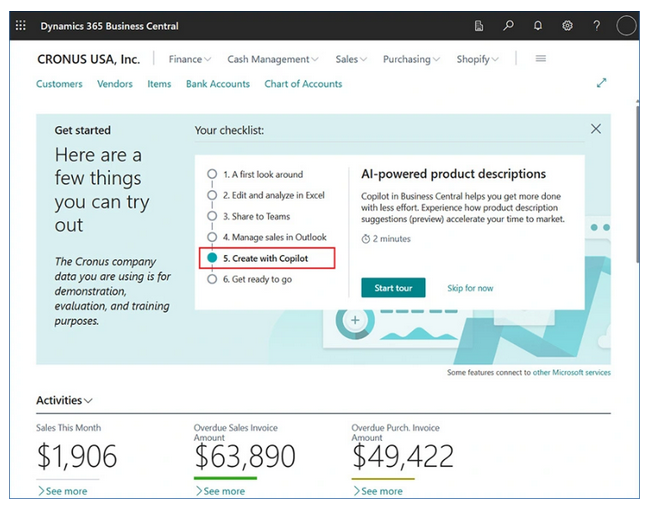Reviewer: Mujahidul Haque
ERP Consultant & Digital Transformation Specialist
Date: 14 June 2025
Executive Summary
Microsoft Dynamics 365 Business Central (D365 BC), a leading mid-market ERP solution, has embraced Artificial Intelligence (AI) as a critical enabler for intelligent business automation. This review examines how AI is embedded into D365 BC, its real-world utility, challenges, and future outlook for digitally maturing organizations. It provides CIOs, consultants, and implementation teams with a holistic evaluation of how AI transforms traditional ERP workflows into data-driven, predictive, and agile decision-making engines.
- Overview of AI Capabilities in D365 BC
Microsoft has gradually infused AI into Business Central through:
| AI Feature Set | Integration Modality | Use Cases |
| Azure AI Services (Cognitive) | Native integration with Azure | OCR, language translation, sentiment analysis |
| Copilot for Business Central | Embedded GPT-based assistant | Sales quote generation, vendor query automation |
| AI-driven Forecasting | Built-in ML models | Cash flow, inventory, and demand forecasting |
| Power BI + AI Visuals | Seamless integration | Predictive dashboards and anomaly detection |
| Power Automate + AI Builder | Low-code automation | Email classification, form processing |
2. Functional Impact Areas
2.1 Finance & Cash Flow
- Cash Flow Forecasting: Enhanced by AI models analyzing historical bank movements, payable/receivable patterns, and predictive vendor/customer behavior.
- Late Payment Prediction: Machine learning flags high-risk customers using payment history, credit score (if integrated), and transaction velocity.
2.2 Sales & Customer Management
- AI Copilot generates quote lines from customer emails and converts them into sales orders.
- Predictive customer segmentation using Azure Machine Learning helps sales teams identify high-value targets.
2.3 Inventory & Supply Chain
- Demand Forecasting: Embedded ML uses historical trends, seasonal factors, and outlier smoothing for accurate stock planning.
- Anomaly Detection: Alerts for unusual stock movement or pricing spikes using AI visualizations in Power BI.
3. Technical Architecture
D365 BC’s AI features leverage the broader Microsoft AI ecosystem:

Key Notes:
- AL developers can expose data to AI services via API/extension.
- Models can be fine-tuned in Azure ML Studio and called via Azure Functions.
| KPI Area | Pre-AI ERP | Post-AI Integration |
| Forecast Accuracy | ~65% | 85% (with clean historical data) |
| Sales Quote Lead Time | Manual, 1–3 days | Instant generation via Copilot |
| Inventory Planning Time | Excel-driven, reactive | Predictive, exception-based |
| Employee Productivity | Transactional focus | Value-added automation |
AI drives cost reduction, productivity, and strategic agility—particularly in volatile supply chains or service sectors.
5. Limitations and Considerations
| Area | Challenge |
| Data Quality | AI predictions depend on clean, well-tagged transactional history |
| Model Transparency | Pre-built models lack full explainability (black box effect) |
| Change Management | User training is essential to trust and interpret AI suggestions |
| Localization | Some AI features (e.g., Copilot) are limited to English and US-centric data formats as of 2025 |
6. Implementation Guidance
- Start with foundational AI: Cash flow forecasting and inventory demand prediction.
- Enable Azure AI connectivity: Especially if planning custom vision/ML scenarios.
- Pilot Copilot: Deploy Copilot in sales and finance departments and collect user feedback.
- Align with Power Platform: Use Power Automate + AI Builder for form automation and classification tasks.
- Data governance: Ensure consistent master data structure to improve model training and inference accuracy.
7. Future Outlook
Microsoft’s roadmap includes:
- Multilingual Copilot capabilities
- Personalized AI assistants for role-specific suggestions
- Integration with Microsoft Fabric for unified data + AI ecosystem
- Federated learning for industry-specific models
The convergence of D365 BC, Power Platform, and Azure AI will redefine mid-market ERP from a transaction system to a predictive business orchestration hub.
Conclusion
Microsoft Dynamics 365 Business Central is AI-enabled by design, not as an afterthought. Its tight integration with Azure AI and the Power Platform makes it a top-tier ERP choice for mid-sized businesses that want to future-proof their operations with intelligent automation.
Organizations already on the Microsoft stack can leverage AI capabilities with minimal friction and scale them progressively to unlock exponential value.


Leave a Reply